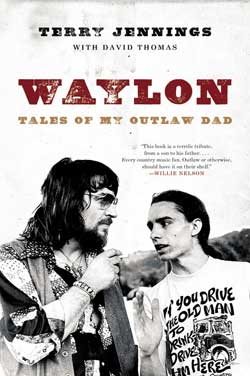|
There must be something in the water (or more specifically the Ogallala Auquifer) that has given rise to such diverse musical acts like
Buddy Holly, Bob Wills, Joe Ely, Birch Hancock, Jimmie Dale Gilmore, Terry Allen, Mac Davis, Don Williams, and last but not least the great Waylon Jennings who hailed from the
West Texas town of Littlefield. Jennings is the subject of a new book by his son Terry called:
Waylon: Tales Of My Outlaw Dad.
Told with candor and brutal honesty, Jennings describes his relationship with his legendary dad as a combination of Andy/Opie and Bart/Homer
Simpson. My eleven year old son can relate to that but much of the book cannot be recommended reading for a pre-teen. It is a tale of sex, drugs, pinball addiction, and...outlaw
country music.
 Jennings begins with his dad's humble origins in Littlefield to the dizzying heights of popularity in the
mid to late 70's on to his friendships/collaborations with Johnny Cash, Kris Kristofferson, and Willie Nelson and ending with Waylon' s sobriety and retirement.
Terry quit high school and went to work for his dad as a drum tech, roadie, and any other assignments deemed necessary to keep team Waylon functioning. Jennings begins with his dad's humble origins in Littlefield to the dizzying heights of popularity in the
mid to late 70's on to his friendships/collaborations with Johnny Cash, Kris Kristofferson, and Willie Nelson and ending with Waylon' s sobriety and retirement.
Terry quit high school and went to work for his dad as a drum tech, roadie, and any other assignments deemed necessary to keep team Waylon functioning.
The book is as much his story as that of his dad's.
Waylon initially rose to prominence as part of Buddy Holly' s backing band on that fateful tour that took his life. Don McLean
described it in American Pie "as the day the music died". Terry got the straight scoop from his dad as to what actually happened
that allowed Holly to board that doomed plane and how Waylon ended up on a frigid bus. The death of his friend in an Iowa cornfield haunted him the rest of his life.
The "outlaw" part of the tale revolves around Waylon' s rebellion
against the entrenched "Nashville Sound" that was prevalent in the 60's and early 70's as a means to soften country music's
harder rough-hewn sound in order to compete with pop radio. Although his rough and rowdy ways and employing Hells Angels
as bodyguards gave some credence to Jennings being an actual outlaw. There were other artists who actually served hard prison
time like David Allan Coe and Johnny Paycheck who were identified as part of the movement.
Just as instrumental as Waylon as far as shaking things up in Nashville was his manager Neil Reshen. Before Reshen came
along, no one had the balls to demand the record labels open up their books and do an honest accounting. Producers would
basically tell artists to just shut up and sing the songs provided for them. Reshen helped Waylon gain almost total control over
his music and ensuring his client was fully compensated by his record label (RCA). At that time, artists were subjected to
accounting trickery that prevented them from receiving their proper royalties. Reshen changed all that. Instead of Waylon
owing $200,000 to RCA, Reshen determined that RCA actually owed Waylon $200,000. And with that leverage, Waylon was able to create his own sound and thus the outlaw movement got
off the ground. His distinctive baritone and guitar riffs were a clarion call to other like minded mavericks to turn the tables and
burn the house down if need be. I had written in another piece how renegade writer/environmentalist Edward Abbey used to
roar through the streets of Phoenix in his Cadillac with Waylon Jennings blasting from the stereo speakers. Jerry Jennings had a
front row view to these proceedings and his retelling of these significant events is fascinating.
Terry shares many road stories, as well as trying to figure out where everybody stood in a somewhat dysfunctional family
propelled by Waylon's four marriages. His last to the lovely, and talented Jessi Colter. He also shares the touching story of his
son's problematic birth just as he was starting to settle down and getting his own life together. His book is also a tale of survival, in
which the number of children born to celebrities who take their own lives is astounding. Terry' s friend Billy Nelson
(son of Willie) is one such statistic. He would later become the CEO of his own music management/publishing company.
Regrets? I'm sure he's had a few, but too few to mention as Frank Sinatra so famously crooned. Yet Terry Jennings realizes
that it took all that to get himself to the place he's at now. And according to him, it's a damn good place to be.
|